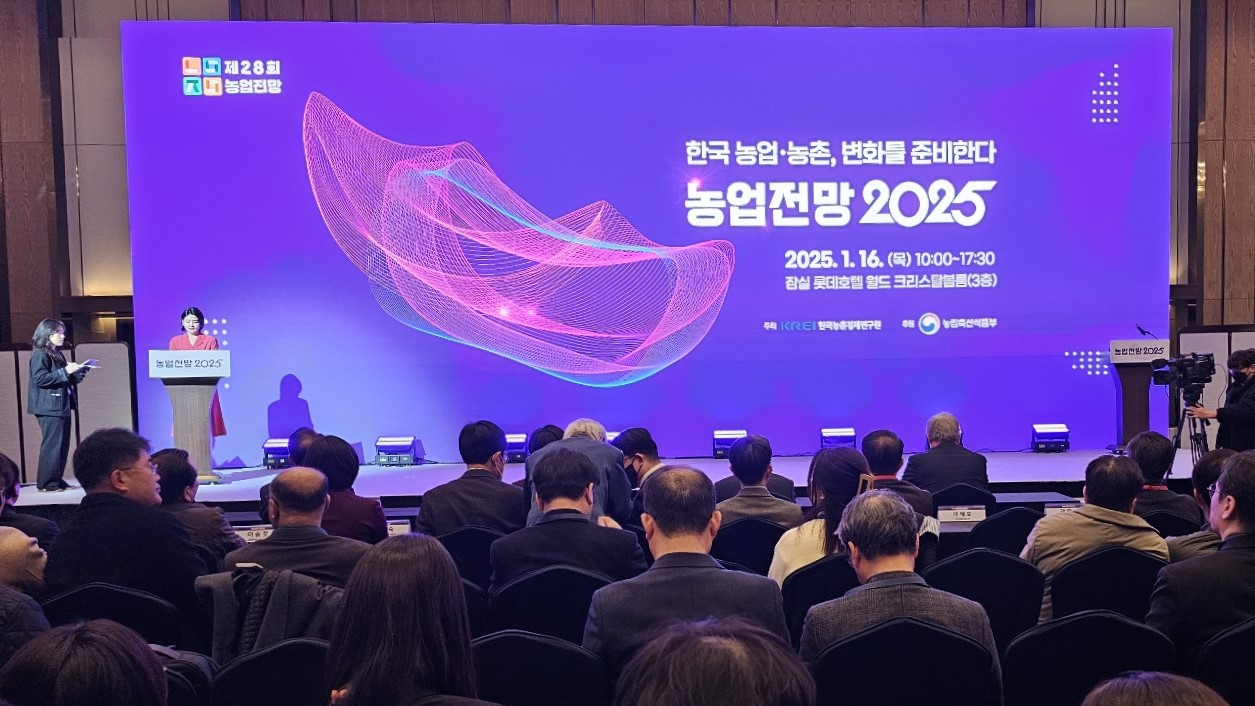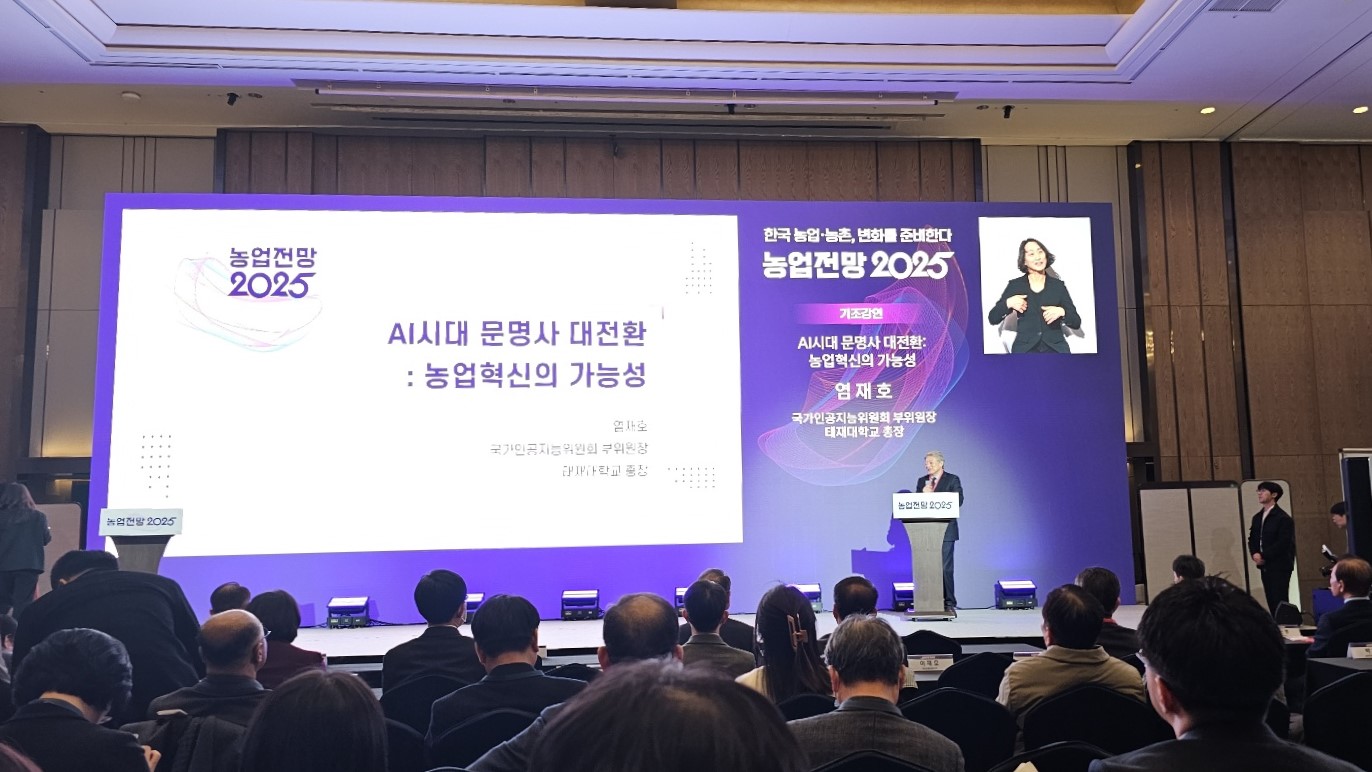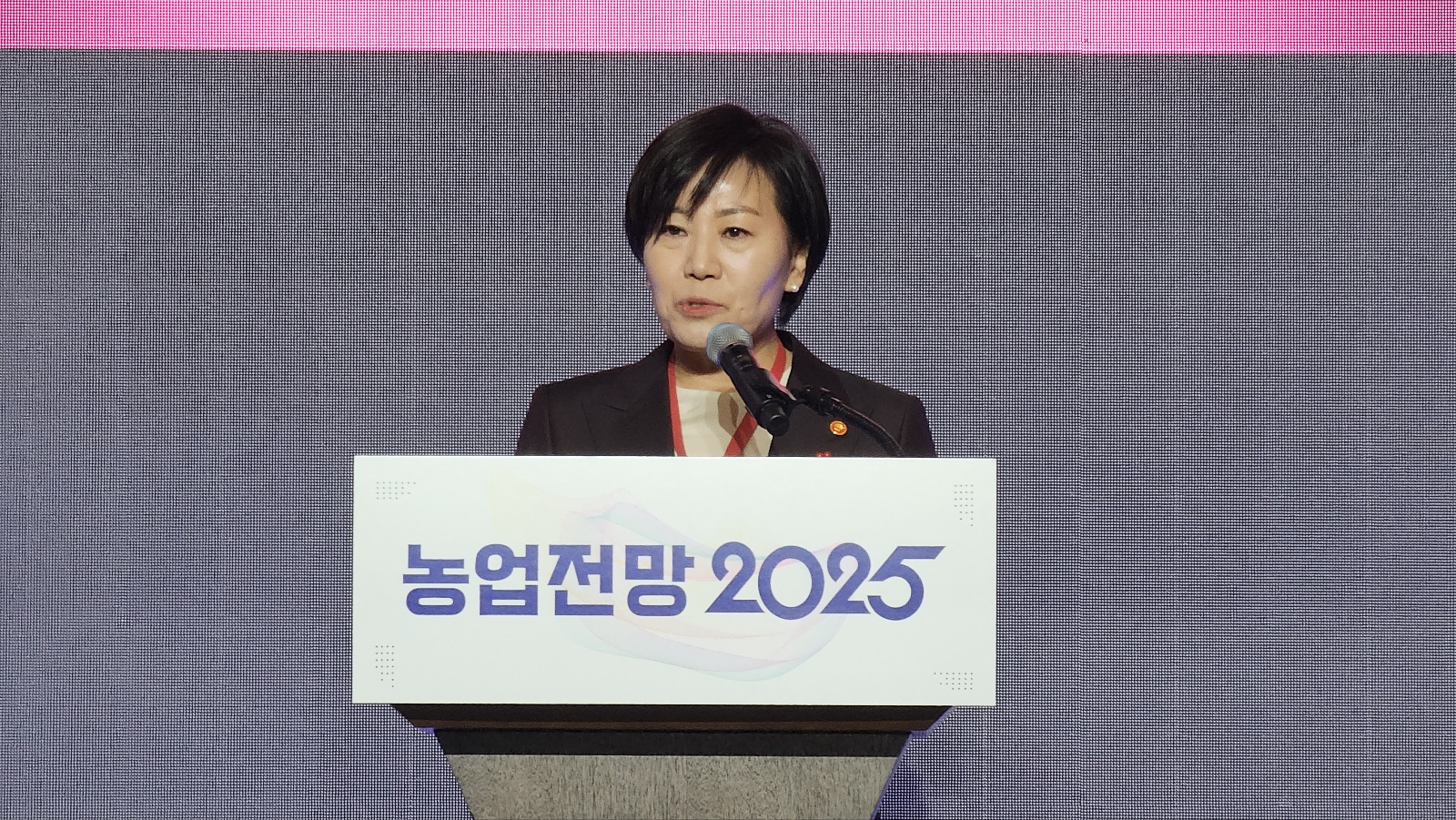현재 세계인구는 80억명으로 2050년에는 97억명에 이를 것으로 전망되는 가운데 기후변화로 인해 식량 안보와 농업 생산성이 미래 국가 생존의 큰 챌린지로 급부상하고 있다. 농산업에서의 과학기술, AI, 디지털 전환 등이 핵심 역량 과제로 대두되는 가운데 미래 농업 전망을 논의하기 위해 각계각층 전문가들이 한자리에 모였다.

▲농업전망 2025
한국농촌경제연구원, 농업전망 2025 개최
“AI 디지털 혁신, 농업의 새로운 방향성”
스마트팜 도입 저조...원예 15%·축산 6%
정부, 연내 스마트 농업 비중 20% 목표
현재 세계인구는 80억명으로 2050년에는 97억명에 이를 것으로 전망되는 가운데 기후변화로 인해 식량 안보와 농업 생산성이 미래 국가 생존의 큰 챌린지로 급부상하고 있다. 농산업에서의 과학기술, AI, 디지털 전환 등이 핵심 역량 과제로 대두되는 가운데 미래 농업 전망을 논의하기 위해 각계각층 전문가들이 한자리에 모였다.
16일 한국농촌경제연구원(KREI)가 서울 잠실 롯데호텔 월드에서 농업전망 2025를 개최해 국내 농업 분야 현황과 미래 전망에 대한 인사이트를 공유했다.
농업전망 2025는 ‘한국 농업·농촌 변화를 준비한다’라는 주제로 국내 농업 환경의 변화 속에서 미래 방향성을 논의했다. 이날 행사는 1,700여명이 사전 등록하며 미래 농업 전망에 큰 관심을 나타냈다.
한두봉 KREI 원장은 “국내 농업은 기후 변화와 글로벌 정치·경제, 디지털 전환 등 다양한 도전에 직면하고 있다”면서, 농업 전망 세션이 “AI 디지털 혁신이 농업을 새로운 방향으로 나아가는 데 인사이트를 제공하고 새로운 방향을 제시하는 자리가 될 것이다”라고 전했다.
기조연설에는 염재호 국가인공지능위원회 부위원장이 ‘AI 시대 문명사 대전환 : 농업 혁신의 가능성’을 주제조 발표했다. 인류 문명사 전체를 변화시키는 AI가 농업에 미치는 영향에 대해 소개했다.

▲염재호 국가인공지능위원회 부위원장
AI 시대 농업 혁신으로 △자율운행 트랙터 △잡초 선별인식과 제초제 살포 △스마트팜과 친환경 대량생산 △머신러닝과 로봇 △작물 센싱과 모니터링 △수확 및 운반 로봇 등을 언급하며, 염 부위원장은 “패러다임 전환으로 공장 체제 스마트팜으로 전환될 가능성이 높다”고 덧붙였다.
농업의 AI 혁신과 디지털 전환으로 보다 쾌적한 환경에서 수익성 있는 농산업체 경영이 가능해질 것으로 전망하는 가운데 이러한 전망 실현된다면 청년들의 농산업 유입과 SW개발 등의 시너지 효과도 상당할 것으로 전문가들은 예측했다.
염 부위원장은 “AI 기후변화 예측을 바탕으로 파종·재배·수확, 출하시기 등을 예측 가능하며, 수요·공급 및 유통 측면에서도 시스템이 완전히 달라지게 될 것”이라면서 AI 통해 수확물 보관, 출하, 유통의 효율화가 이뤄질 것이라고 예상했다.
김상호 KREI 동향분석실장은 “농업의 전통적인 생산 중심에는 한계가 있어 AI, 스마트팜, 디지털 전환을 통해 제약사항을 돌파하는 전략 마련이 필요하다”면서, “디지털 기술 활용이 낮은 수준에 머물고 있어 △정보 연계성 및 활용도 강화 △기상환경 유형별 재배기술 표준화 △디지털 기기 및 설비 보급 확대 △디지털 기술 교육 강화 등의 이슈가 올해도 이어질 것으로 보인다”고 전망했다.
전세계 산업 및 기업의 디지털전환이 가속화되고 있는데 가운데 해외 스마트농업 도입과 전환도 빠른 속도로 이뤄지고 있는 상황이다. 이에 정부는 2027년까지 스마트농업 전환 목표율을 농업생산의 30%로 목표하고 있지만 현재 스마트팜 도입율은 전체 시설원예 중 15%, 축산농가 가운데 6% 수준에 머물고 있어 전환이 지지부진한 형국이다.
서대석 연구원은 “스마트팜 도입 농가 중심으로 규모화에 강한 의지를 표명하고 있다”면서, “생산성 증대 효과가 분명하게 있는 것으로 파악되며 경제적 효과도 입증이 됐다”고 전했다. 이에 스마트팜 파급효과 확산에 정부의 대응이 요구되고 있다.

▲송미령 농림축산식품부 장관
송미령 농림축산식품부 장관은 이날 축사를 통해 “디지털전환, 세대전환, 공간 전환이라는 3대 전환이 우리 농촌의 미래를 바꿀 수 있는 길이라고 여기며 농업 미래를 위한 구조 전환과 혁신 과제를 적극 추진해 나가고자 한다”면서, 농산물 유통 전 과정에 디지털 기술을 적용하는 스마트 APC 플랫폼을 60개소로 확대하는 정책을 추진한다고 밝혔다.
송 장관은 “스마트 농업 생산 비중을 2024년 16% 수준에서 2025년 20% 수준까지 확대하고 농업용 AI 로봇 등 첨단 기술과 전후방 산업을 연계하는 데 전력을 다하겠다”며, “미래 산업 분야 중장기 현안 및 현안 수요가 많은 과제 대해 대규모 R&D를 집중 투자할 계획”이라고 전했다.


